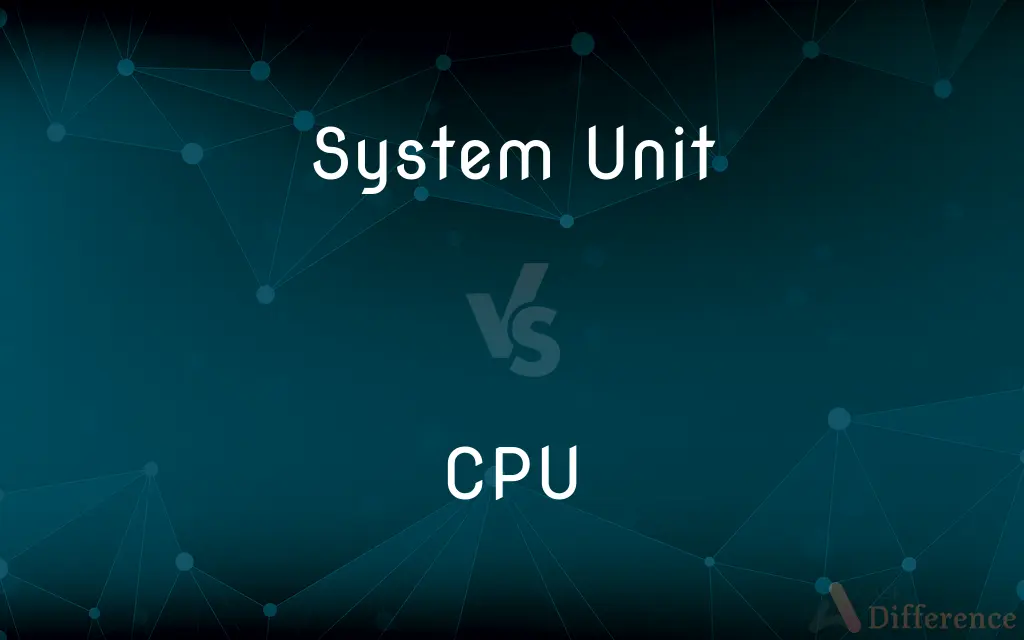System Unit vs. CPU — What's the Difference?
By Tayyaba Rehman & Urooj Arif — Published on June 21, 2024
The system unit houses multiple components including the CPU, which executes instructions, while the CPU is a core processing unit, crucial for computer operations.

Difference Between System Unit and CPU
Table of Contents
ADVERTISEMENT
Key Differences
The system unit refers to the main body of a desktop computer, encompassing various components such as the motherboard, CPU (Central Processing Unit), RAM (Random Access Memory), storage devices, and power supply. It acts as the housing for these critical components, facilitating their interconnection and operation. The CPU, on the other hand, is a specific component within the system unit, often regarded as the computer's brain, responsible for executing instructions from software through basic arithmetic, control, and input/output operations.
The system unit includes the physical case and the internal components that make a computer function, while the CPU's role is purely computational. It processes instructions from programs and operating systems, making it essential for the computer's overall performance. Whereas the system unit's design and configuration can vary significantly depending on the computer's purpose and the user's needs, ranging from simple office workstations to high-end gaming PCs.
The CPU operates at the heart of the system unit, interfacing directly with other components via the motherboard. The system unit's architecture is designed to optimize the CPU's access to RAM, storage, and peripheral devices, ensuring efficient data processing and transfer. In contrast, the CPU's design focuses on processing speed, cache memory, and core count, directly influencing the computer's ability to perform complex tasks and multitask efficiently.
Cooling is another aspect where the system unit and the CPU differ significantly. The system unit is designed with ventilation and fans to dissipate heat from all components, including the CPU. CPUs, however, require specific cooling solutions, such as heatsinks and liquid cooling systems, to maintain optimal operating temperatures due to their high heat generation during intense computational tasks.
In terms of upgradeability, the system unit provides a flexible framework that allows for the replacement or upgrade of components, including the CPU. This flexibility enables users to enhance their computer's performance or capacity over time. The CPU's upgradeability, while possible, is dependent on the motherboard's compatibility with newer CPU models, highlighting a direct dependency on the system unit's configuration.
ADVERTISEMENT
Comparison Chart
Definition
The main body of a desktop computer, housing various components.
A specific component responsible for executing instructions.
Components Included
Motherboard, CPU, RAM, storage, power supply.
Arithmetic logic unit, control unit, registers.
Function
Facilitates the interconnection and operation of internal components.
Processes instructions from software and performs computations.
Cooling Requirements
Designed with overall ventilation and fans.
Requires specific cooling solutions like heatsinks or liquid cooling.
Upgradeability
Allows for the replacement or upgrade of internal components.
Upgradeability depends on motherboard compatibility.
Compare with Definitions
System Unit
Designed to ensure efficient cooling and ventilation for all housed components.
The system unit's advanced cooling system kept it running smoothly under load.
CPU
Contains cores that process instructions simultaneously for multitasking.
The quad-core CPU could handle multiple applications at once without lag.
System Unit
Offers flexibility for upgrading components like the CPU and graphics card.
He opened the system unit to upgrade the CPU for better gaming performance.
CPU
Directly interfaces with RAM and other components for efficient data processing.
The CPU's fast interface with RAM enabled quicker program execution.
System Unit
The chassis that contains a computer's critical components, excluding external peripherals.
The new desktop's system unit was compact yet powerful.
CPU
The primary component in a computer responsible for executing program instructions.
The new CPU significantly improved the computer's processing speed.
System Unit
Encloses and supports components like the motherboard and power supply for operation.
Upgrading the system unit involved adding more RAM and a larger hard drive.
CPU
Utilizes cache memory for high-speed data access.
The CPU's large cache reduced data retrieval times, enhancing performance.
System Unit
Acts as the physical framework that defines the computer's capabilities.
The system unit was engineered for easy access and maintenance.
CPU
Its performance is measured in GHz, indicating processing speed.
The 3.5 GHz CPU offered rapid computation for demanding software.
CPU
The central processing unit, that part of the electronic circuitry of a computer in which the arithmetic and logical operations are performed on input data, which are thereby converted to output data; it is usually located on the mainboard, or motherboard, of a computer. The CPU and the memory form the central part of a computer to which the peripherals are attached. Most personal computers as of 1998 had only one CPU, but some computers may have more than one CPU.
CPU
(computer science) the part of a computer (a microprocessor chip) that does most of the data processing; the CPU and the memory form the central part of a computer to which the peripherals are attached
Common Curiosities
Is it possible to upgrade the CPU without changing the system unit?
Yes, it's possible to upgrade the CPU without changing the entire system unit, provided the new CPU is compatible with the motherboard.
What role does the system unit play in cooling the computer?
The system unit plays a critical role in cooling by housing fans and ventilation systems to dissipate heat from the CPU and other components.
What differentiates a system unit from a CPU?
A system unit is the case that houses computer components including the CPU, which is the component responsible for executing instructions.
Can the system unit's design impact computer performance?
Yes, the design of the system unit can impact performance through its influence on cooling efficiency and the capacity to house different components.
What components are essential for a CPU to function within a system unit?
Essential components for CPU function include RAM, a power supply, and a motherboard for interfacing with other components.
Can a system unit operate with multiple CPUs?
Yes, some high-end system units and servers can operate with multiple CPUs to enhance processing power and performance.
How does the CPU affect a computer's performance?
The CPU significantly affects a computer's performance through its processing speed, number of cores, and efficiency in executing instructions.
What is the relationship between the system unit and the motherboard?
The system unit houses the motherboard, which serves as the main circuit board connecting the CPU, RAM, and other components.
How does the number of CPU cores influence computing tasks?
The number of CPU cores influences computing tasks by enabling parallel processing, which improves multitasking and performance in multi-threaded applications.
How does CPU cache size affect computing performance?
CPU cache size affects computing performance by determining how much data the CPU can store temporarily for quick access, impacting speed and efficiency.
Can a computer function without a CPU?
No, a computer cannot function without a CPU as it is essential for processing instructions and operating the system.
Is it necessary to have a large system unit for better performance?
Not necessarily; performance depends more on the quality and configuration of the internal components like the CPU, rather than the size of the system unit.
Why is the CPU called the brain of the computer?
The CPU is called the brain of the computer because it processes all instructions and makes decisions, similar to how a brain controls a body.
How do advancements in CPU technology affect computer capabilities?
Advancements in CPU technology enhance computer capabilities by increasing processing power, efficiency, and the ability to handle more tasks simultaneously.
Share Your Discovery

Previous Comparison
Baseball Bat vs. Softball Bat
Next Comparison
Concrete Spalling vs. Concrete ScalingAuthor Spotlight
Written by
Tayyaba RehmanTayyaba Rehman is a distinguished writer, currently serving as a primary contributor to askdifference.com. As a researcher in semantics and etymology, Tayyaba's passion for the complexity of languages and their distinctions has found a perfect home on the platform. Tayyaba delves into the intricacies of language, distinguishing between commonly confused words and phrases, thereby providing clarity for readers worldwide.
Co-written by
Urooj ArifUrooj is a skilled content writer at Ask Difference, known for her exceptional ability to simplify complex topics into engaging and informative content. With a passion for research and a flair for clear, concise writing, she consistently delivers articles that resonate with our diverse audience.












































